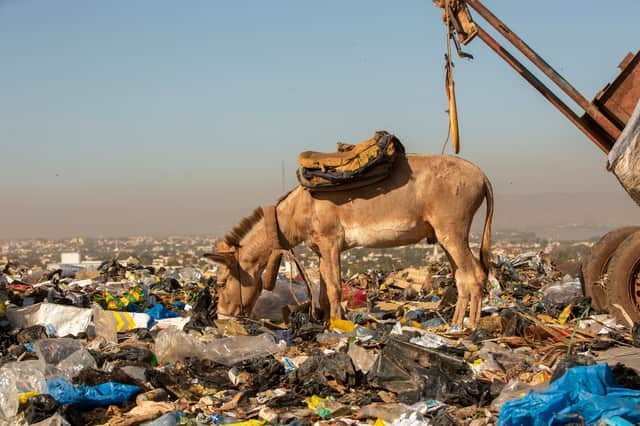Heartbreaking footage shows impact of plastic pollution on animals


These harrowing images of donkeys desperately scavenging for food in temperatures as high as 40-degrees have been released to highlight the devastating impact of plastic pollution on working animals.
The pictures taken in Mali, India and Morocco show working animals searching for food among mountains of plastic and other waste.
Advertisement
Hide AdAdvertisement
Hide AdIn vulnerable communities across the world, working animals help their owners earn a small income by transporting water and goods – and even carrying waste and plastic itself to rubbish dumps.
But the global explosion in plastic pollution is posing a deadly threat for donkeys and other working animals.
The cost of living crisis, coupled with growing global inequality, is making it harder for owners to buy food for their animals.
As a result, hungry animals are grazing for food in rubbish dumps and fields full of litter. These animals can accidentally ingest plastic, putting them at severe risk from internal blockages and life-threatening conditions such as colic.
Advertisement
Hide AdAdvertisement
Hide AdThe heartbreaking footage comes after research from working animal charity SPANA (the Society for the Protection of Animals Abroad) found 67 per cent of people in Britain didn’t realise working animals such as donkeys, horses and camels overseas could face health issues due to plastic pollution.
And 71 per cent were unaware that plastic pollution can have fatal consequences, affecting thousands of innocent animals.
Linda Edwards, Chief Executive of SPANA, which is raising awareness about the problem of plastic pollution on International Working Animal Day (15 June), said: “Working animals have a critical role supporting families in vulnerable communities, but our research shows there is very little awareness about the deadly impact plastic waste has on these animals.
“We are making a lifesaving difference to working animals under severe threat from plastic pollution, by providing vital veterinary treatment and supporting owners with information and guidance on the dangers of plastic waste to their animals.”
Advertisement
Hide AdAdvertisement
Hide AdThe poll of 2,000 adults also found 76 per cent would like society to move towards a zero plastic or waste future, to prevent the harm caused to working animals.
And just under eight in 10 (79 per cent) say they feel motivated to reduce how much plastic waste they personally generate, to help alleviate the plight of working animals.
Data from the Organisation for Economic Co-operation and Development shows 353 million tonnes of plastic waste were generated globally in 2019, and only nine per cent of plastic waste is recycled.
Worldwide, the amount of plastic waste generated more than doubled from 2000 to 2019.
Advertisement
Hide AdAdvertisement
Hide AdMismanaged waste – plastic that is either littered, or not disposed of properly – is a huge problem.
While the UK is estimated to produce just under 0.5kg of mismanaged plastic waste per person, Zimbabwe generates 36kg, Tanzania creates 30kg, and Tunisia 25kg by comparison.
Overall, only one in 20 (five per cent) of adults polled claim to be very knowledgeable about the lives of working animals in low-income countries.
Global lack of awareness of the interconnection between animal welfare, environment and sustainability
And the vast majority (82 per cent) had no idea about the 2022 UN Nexus Resolution, which recognises the interdependence between animal welfare, the environment and sustainable development.
Advertisement
Hide AdAdvertisement
Hide AdThere are estimated to be more than 200 million working animals globally, including donkeys, horses, mules, camels, oxen and elephants.
Last year, SPANA provided vital care and support to 306,412 working animals across the world – including in Mali, at the rubbish dumps seen in the video.
Colic – a life-threatening condition, which can be caused by eating plastic and foreign objects – is one of the most common problems treated by SPANA’s veterinary teams.
In some parts of Morocco, where SPANA works, colic ranks as the second most common problem treated by the charity’s vets, after lameness.
Advertisement
Hide AdAdvertisement
Hide AdWithout treatment, working horses, donkeys and mules can have little chance of surviving colic.
Linda Edwards added: “Sadly, many working animals in low-income countries live very difficult lives, working in extreme conditions and suffering from poor welfare.
“That is why SPANA’s work is so important – offering a lifeline to working animals in desperate need and transforming their welfare. We are providing training in animal care in owners and bringing about long-term, lasting change through our animal welfare classes for children.
“Plastic pollution is one of the many environmental threats facing working animals, alongside climate change, drought, cyclones and flooding.
Advertisement
Hide AdAdvertisement
Hide Ad"However, the deadly impact these issues have on working animals is often overlooked.
“Working animals can no longer be ignored – and it’s critical that they receive the recognition and urgent help they need.”